Liberals leadingpublished at 01:33 BST 22 October 2019Breaking
Despite some losses on the east coast, Trudeau's Liberals have an early lead.
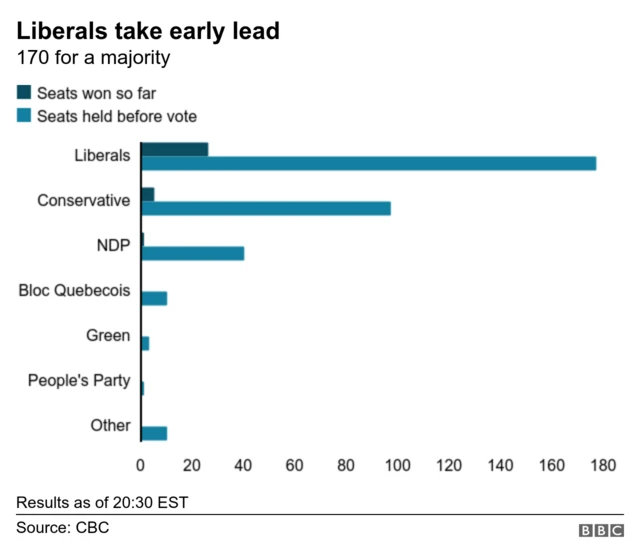
Millions of Canadians have voted in another Liberal government under Justin Trudeau
"You did it my friends. Congratulations!" he told cheering supporters in Montreal.
His Liberal Party has lost its majority, however, and will rely on the votes of other parties
It's been a bad night for Andrew Scheer's Conservative Party, although it may win the popular vote
This election saw the largest-ever number of female candidates running
Holly Honderich and Ritu Prasad
Despite some losses on the east coast, Trudeau's Liberals have an early lead.

Immigration policy is one of the key issues in this election.
So is there any truth to the claim that Canada has taken in more migrants per capita than any other Western country?
In a word, no. But Canada is in the top four Western nations both for the total number of migrants taken in and for the proportion in its overall population.
During Trudeau's term tens of thousands of Syrians have settled in the country, which has also looked to attract skilled migrants to boost its workforce.
Under Trudeau, the number of migrants entering Canada has risen to about 300,000 per year. The annual average for the previous decade stood at about 250,000, according to the national statistics office.
Read more about what the numbers say - and what the candidates think about immigration - here.
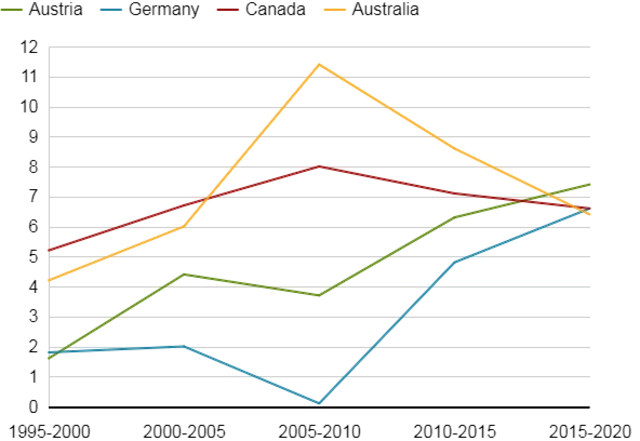
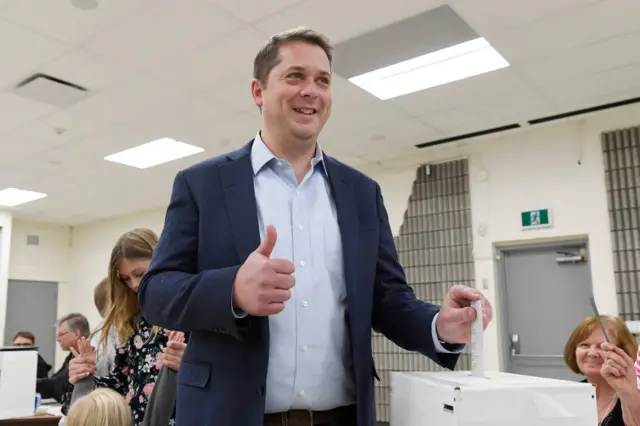 Image source, Getty Images
Image source, Getty ImagesConservative Leader Andrew Scheer votes in Regina, Saskatchewan
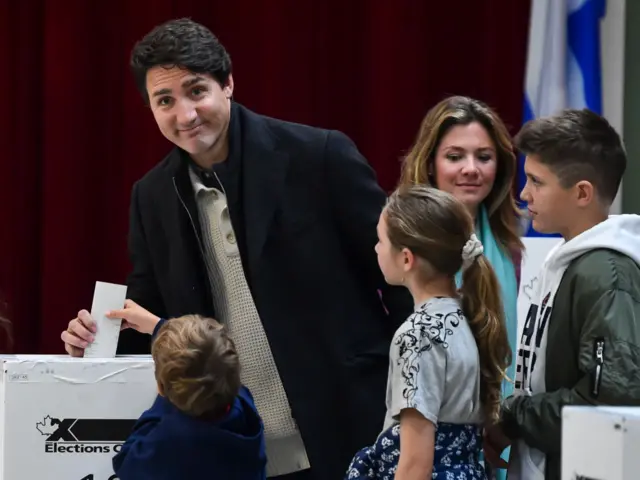 Image source, Getty Images
Image source, Getty ImagesPrime Minister Justin Trudeau votes surrounded by his family in Montreal
Allow X content?
This article contains content provided by X. We ask for your permission before anything is loaded, as they may be using cookies and other technologies. You may want to read X’s cookie policy, external and privacy policy, external before accepting. To view this content choose ‘accept and continue’.
Allow X content?
This article contains content provided by X. We ask for your permission before anything is loaded, as they may be using cookies and other technologies. You may want to read X’s cookie policy, external and privacy policy, external before accepting. To view this content choose ‘accept and continue’.
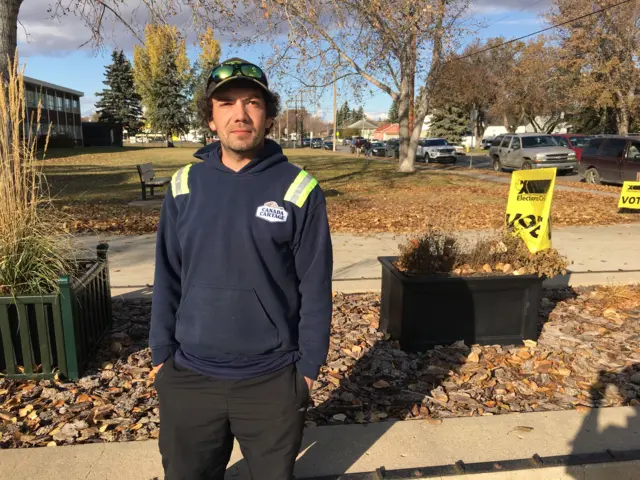
Allow X content?
This article contains content provided by X. We ask for your permission before anything is loaded, as they may be using cookies and other technologies. You may want to read X’s cookie policy, external and privacy policy, external before accepting. To view this content choose ‘accept and continue’.
Allow X content?
This article contains content provided by X. We ask for your permission before anything is loaded, as they may be using cookies and other technologies. You may want to read X’s cookie policy, external and privacy policy, external before accepting. To view this content choose ‘accept and continue’.
Holly Honderich
BBC News, Washington DC
Polls are now closed across Atlantic Canada - a region that went entirely Liberal in 2015. The area includes a cabinet seat for Seamus O'Regan, the minister of Indigenous Services and Trudeau's sole cabinet member from Newfoundland and Labrador.
The Liberals have already lost their East Coast bloc, a possible indication of early strain. The last time around they won all 32 seats in the region. Of the 26 called so far today, the Liberals won 16, the Conservatives nine, and the New Democrats one.
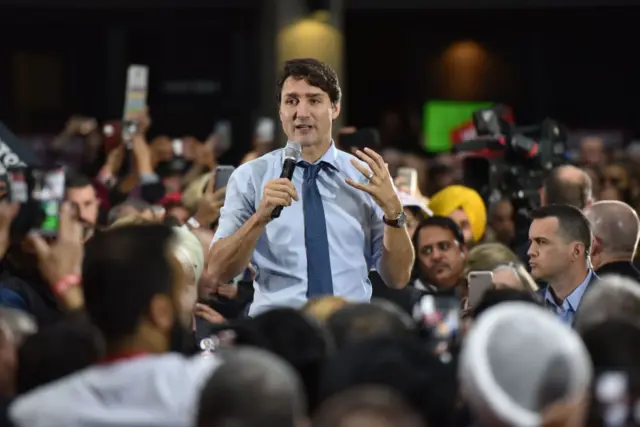 Image source, Photo by DON MACKINNON/AFP via Getty Images
Image source, Photo by DON MACKINNON/AFP via Getty ImagesLyse Doucet
Chief International Correspondent, Toronto
Canada prides itself on being a nation of consensus and shared values.
There is a big middle ground. But it will make a difference if Liberals or Conservatives pull ahead in one of the closest races Canada has ever seen.
And it also matters which of the smaller parties holds the balance of power. The New Democratic Party and the Greens are expected to win more seats. The Bloc Quebecois could make a comeback.
Justin Trudeau’s progressive brand took a beating over the past four years. But it still stands apart from Andrew Scheer’s Conservative agenda.
Scheer presents himself as an ordinary guy in contrast to what has been Trudeau’s celebrity status - his emphasis is on cutting taxes, including the carbon tax at the centre of the Liberals’ climate plan.
With what’s likely to be a minority government, more political battles lie ahead in Canada’s new parliament.
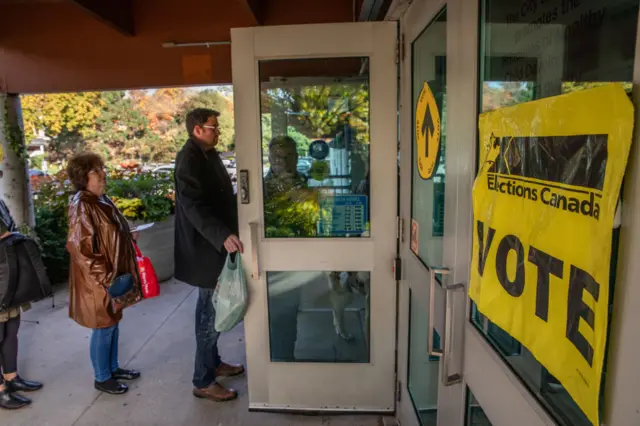 Image source, Getty Images
Image source, Getty ImagesJessica Murphy, BBC News, Montreal
At the Liberal headquarters, Rob Silver, a Liberal strategist and the husband to Justin Trudeau's chief-of-staff, is predicting that the night won’t be as close as some of the polling has suggested.
“I think we’re going to have an OK night, whether it’s a majority or a minority,” he tells the BBC, shortly before early results begin to trickle in from Canada’s east coast.
Even if the Liberals lose their majority, he says, "people will be satisfied because if you still get to be prime minister at the end of the election then it’s a victory".
He says that Trudeau isn’t the first party leader to face a tough re-election campaign after a seemingly easy victory the first time around.
Silver points to south of the border and former President Barack Obama, who had a tough fight for a second term in 2012.
So he says: “I don’t think it’s a surprise that it was a different election than four years ago.”
Holly Honderich
BBC News, Washington DC
Justin Trudeau swept to power in 2015 promising "real change" with a slew of progressive pledges.
An independent, non-partisan assessment, external by two dozen Canadian academics found that Trudeau has kept - fully or partially - 92% of 353 promises from the 2015 campaign, the most by any Canadian government in 35 years.
Still, it remains to be seen if Canadians are happy enough with the prime minister's record to vote him back in.
Read more about Trudeau's challenges here.
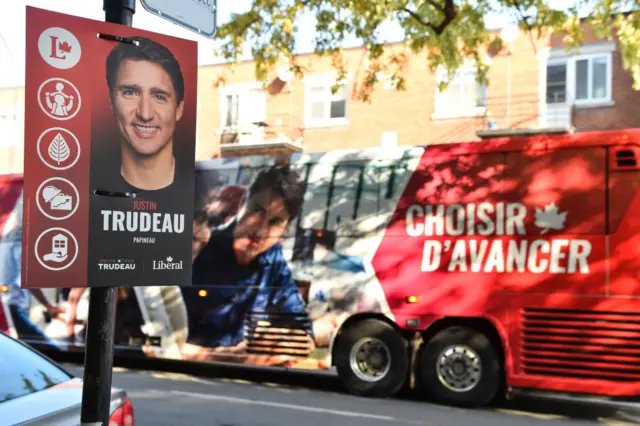 Image source, Minas Panagiotakis/Getty Images
Image source, Minas Panagiotakis/Getty ImagesThe region is made up of the provinces of New Brunswick, Nova Scotia, Prince Edward Island, in addition to Newfoundland and Labrador.
Polls are still open across most of the country, though they've now closed on the east coast.
Parties have been making their pitches to voters over the past five weeks - and have sharpened their attacks.
From blackface scandals to wildcard candidates, here are five things you should know about elxn43.
Health care is a perennial concern for Canadian voters.
But climate change has emerged as one of the issues that matters most to voters.
Read more here.
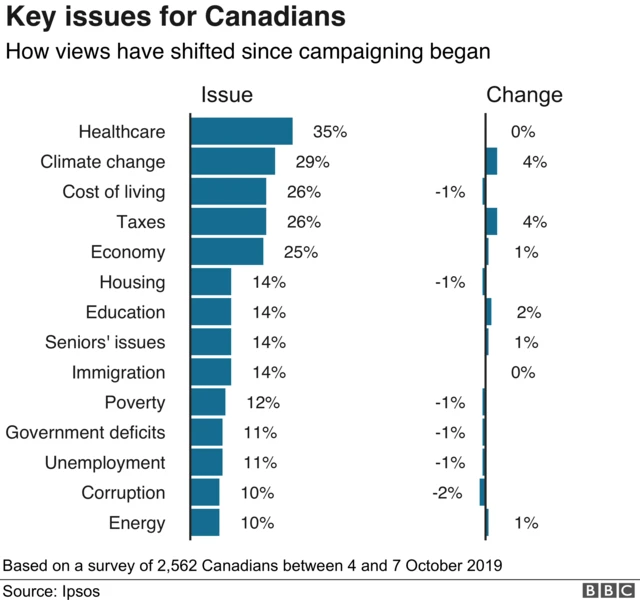
This election has seen the largest number of female candidates ever, with 651 across all parties - a 9% increase from 2015, according to Equal Voice Canada.
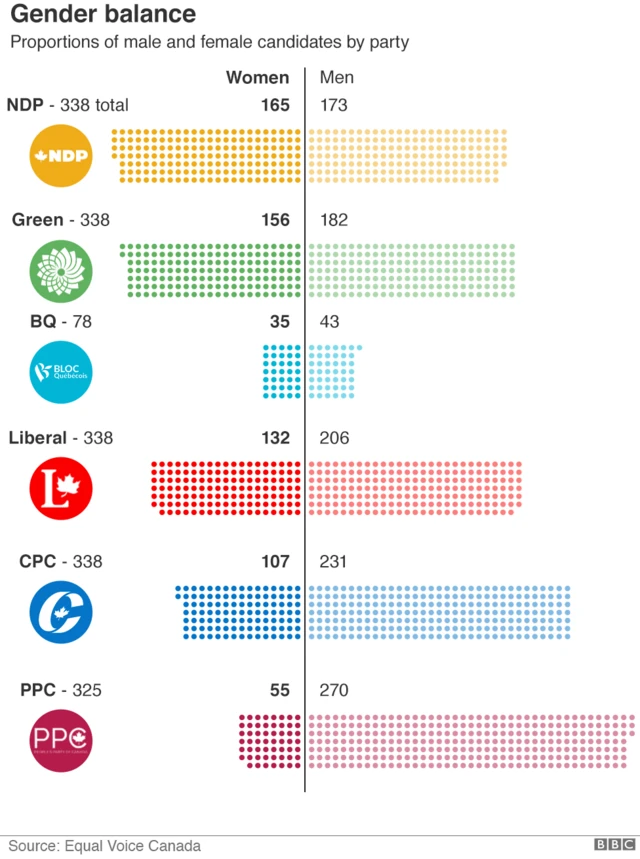
The focus of campaigning tends to be on the party leaders and who will be prime minister.
But in reality, under Canada's system of government, it's 338 separate races, with candidates in each of the country's federal ridings (constituencies) from coast to coast to coast.
They are all fighting for their chance to sit in Canada's House of Commons - which loosely resembles its British namesake.
There are two scenarios - a majority and a minority government (or hung parliament). If one party wins 170 seats or more, Canada will have a majority government.
In 2015, Justin Trudeau and his Liberal candidates won 184 seats - a solid majority. Minority governments are formed when no party wins more than half the seats.
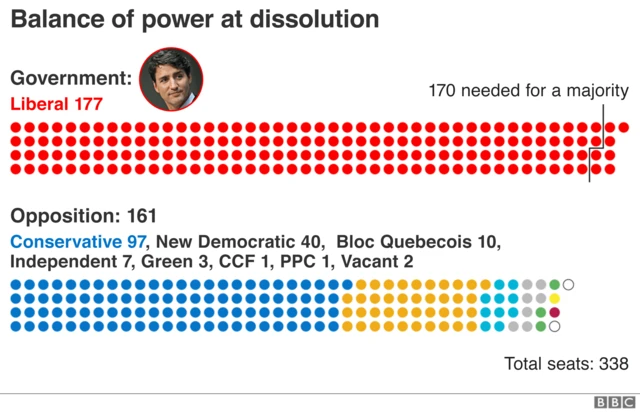
Robin Levinson King, BBC News, Toronto
For many across the country, this election has become a referendum on Prime Minister Justin Trudeau.
“I think it’s a vote where you’re voting someone out instead of voting someone in,” says grandmother Lynn Ash, who cast her ballot in the Saskatchewan district held by Conservative leader Andrew Scheer.
The area is a mix of urban and rural, and is in the heart of Canada’s prairies, where industries like oil, gas and agriculture are big employers.
Scheer has promised to scrap Trudeau’s carbon tax, the linchpin of the Liberal’s strategy to tackle climate change.
Ash says she’s seen how the tax has raised the cost of fresh food at the grocery store where she works, and the cost of fuel at the pump.
“We don’t have a transit system that will allow you get from Regina to Saskatoon,” she said.
There are some things about Scheer that give her pause, specifically his personal stance on gay marriage and women’s rights. Early in the election campaign, Trudeau’s Liberals released video footage of comments Mr Scheer had previously made opposing gay marriage and abortion, two hot-button issues he has said he won’t bring up in parliament if the Conservatives get into power.
“I believe he’s conservative to the bone – and I don’t necessarily think that’s a good thing,” she said.
Both abortion rights and same-sex marriage are popular in Canada.
A 2017 IPSOS poll found 77% of Canadians approve of legal abortion, external. Two-thirds of Canadians also support same-sex marriage, according to a recent online survey, external.
Trudeau has made progressive issues an integral part of his own brand, as well as his party's platform. The Liberals' slogan "Choose Forward" reflects this strategy, and implies that voting Conservative would be a step backward.
So where does Scheer stand on the issues?
Read about it here.
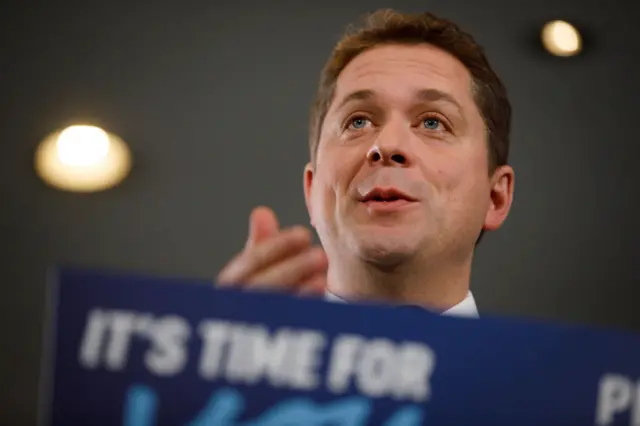 Image source, Photo by Cole Burston/Getty Images
Image source, Photo by Cole Burston/Getty ImagesRobin Levinson King, BBC News, Toronto
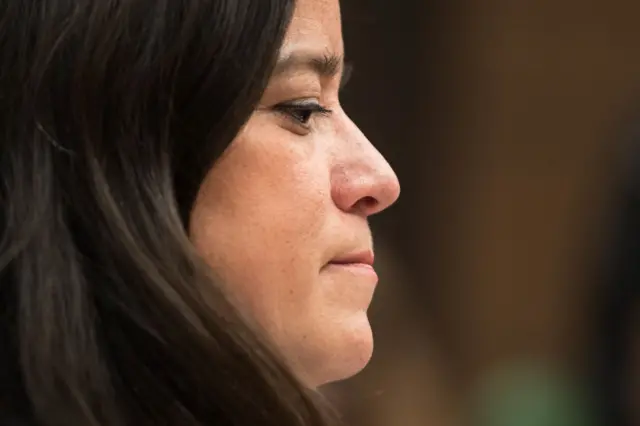 Image source, LARS HAGBERG/AFP/Getty Images
Image source, LARS HAGBERG/AFP/Getty ImagesCanadian MP Jody Wilson-Raybould was booted from the Liberal Party by Justin Trudeau. Could she be the one to take him down?
If Jody Wilson-Raybould had her own walk-up song, like major league baseball athletes, then surely Destiny's Child's Independent Woman would play every time she went up to bat.
The 48-year-old MP is running as an independent, having been kicked out of the Liberal Party for complaining publicly over the SNC-Lavalin political scandal.
Although she was courted by several other parties, she says she ultimately decided to go it alone as an independent.
"We need to, as much as we can, take off our partisan hats and have discussions about issues," she tells the BBC.
Read the full story here.
Climate is at the forefront of this election.
Here's where the parties stand:
Liberals - net-zero emissions by 2050; exceed Canada's 2030 emissions goal set by the Paris accord
Conservatives - repeal the carbon tax enacted by the Liberals. Fund and export green technology innovation, meet current Paris targets
New Democratic Party- bring in emissions targets in line with keeping global warming to 1.5C; end oil and gas subsidies
Green - reduce by 60% greenhouse gas emissions to below 2005 levels by 2030; net-zero emissions by 2050
Climate change: Montreal sees hundreds of thousands strike
Jessica Murphy, BBC News, Toronto
Pollsters have been carefully tracking voting intentions for weeks. By the end of the night we will find out which, if any, was right.
So what do they predict?
Let’s start will some of the polling aggregators.
By all accounts, this is a tight race between the Liberals and the Conservatives.
338Canada, external has the Liberals slightly in the lead in terms of seat projections, as does the CBC's Poll Tracker, external. And while they offer a wide margin of error, a minority scenario is predicted to be likeliest.
Website Too Close to Call is also projecting a minority outcome with the Liberals and the Conservatives tied with 129 seats each.
A number of individual polling firms have offered projections. Abacus Data has the Liberals in a narrow lead nationally, with strong support in Ontario and Atlantic Canada.
Ekos is the most bullish for the Liberals, projecting they’ll be within a razor’s edge of another majority - 170 or more seats - by winning about 163 seats.
Forum also has the Liberals with the most seats - around 140 - but well short of a minority, and Ipsos has the Conservatives with a slight edge in popular vote but with the Liberals doing well in vote-rich regions, like Ontario Province.
Need a refresher on Trudeau's record? We've got you covered.
Four years of Trudeau in two minutes